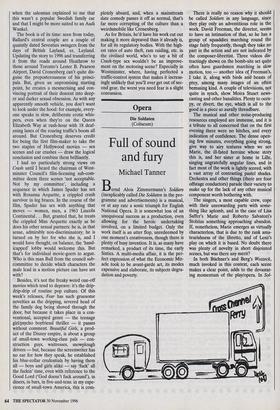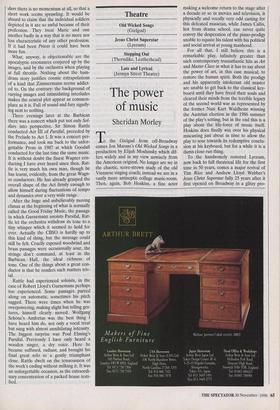Opera
Die Soldaten (Coliseum)
Full of sound and fury
Michael Tanner
Bernd Alois Zimmermann's Soldiers (inexplicably called Die Soldaten in the pro- gramme and advertisements) is a musical, or at any rate a sonic triumph for English National Opera. It is somewhat less of an unequivocal success as a production, even allowing for the heroic undertaking involved, on a limited budget. Only the work itself is an utter flop, unredeemed by one moment's creativeness, though there is plenty of busy invention. It is, as many have remarked, a product of its time, the early Sixties. A multi-media affair, it is the per- fect expression of what the Economic Mir- acle took to be avant-garde art, its modes expensive and elaborate, its subjects degra- dation and poverty. There is really no reason why it should be called Soldiers in any language, since they play only an adventitious role in the work. David Freeman, the director, seems to have an intimation of that, so he has a group of squaddies marching round the stage fairly frequently, though they take no part in the action and are not indicated by the composer-librettist. Three videos dis- tractingly shown on the bomb-site set quite often have guardsmen marching in slow motion, too — another idea of Freeman's, I take it, along with birds and beasts of prey, among many images of an often bemusing kind. A couple of televisions, not quite in synch, show Moira Stuart news- casting and other banalities. Plenty to occu- py, or divert, the eye, which is all to the good in a piece so aurally threadbare.
The musical and other noise-producing resources employed are immense, and it is a tribute to all concerned that on the first evening there were no hitches, and every indication of confidence. The dense open- ing few minutes, everything going strong, give way to airy textures when we see Marie, the ill-fated heroine whose story this is, and her sister at home in Lille, singing ungratefully angular lines, and in fact most of the work is lightly scored, with a vast array of contrasting pastel shades. Orchestra and other things (there are four offstage conductors) parade their variety to make up for the lack of any other musical component worth bothering with.
The singers, a most capable crew, cope with their unrewarding parts with some- thing like aplomb, and in the case of Lisa Saffer's Marie and Roberto Salvatori's Stolzius something approaching abandon. If, nonetheless, Marie emerges as virtually characterless, that is due to the rank ama- teurishness of the libretto, and of Lenz's play on which it is based. No doubt there was plenty of novelty in short disjointed scenes, but was there any merit?
In both Biichner's and Berg's Wozzeck, much invoked in this context, each scene makes a clear point, adds to the devastat- ing momentum of the play/opera. In So/- diers there is no momentum at all, so that a short work seems sprawling. It would be absurd to claim that the individual soldiers depicted in it are so awful because of their profession. They treat Marie and one another badly in a way that is no more nor less characteristic of any other profession. If it had been Priests it could have been more fun.
What, anyway, is objectionable are the apocalyptic resonances conjured up by the images, and by the orchestra when playing at full throttle. Nothing about the hum- drum story justifies cosmic extrapolations of a kind that Zimmermann seems addict- ed to. On the contrary: the background of varying images and intimidating interludes makes the central plot appear as common- place as it is. Full of sound and fury signify- ing next to nothing.
Three evenings later at the Barbican there was a concert which put not only Sol- diers into perspective. Sir Simon Rattle conducted Act III of Parsifal, preceded by the Prelude to Act I. It was a concert per- formance, and took me back to the unfor- gettable Prom in 1987 at which Goodall conducted for the last time the same music. It is without doubt the finest Wagner con- ducting I have ever heard since then. Rat- tle is very much his own man, though he has learnt, evidently, from the great Wagn- er conductors. He has already grasped the overall shape of the Act firmly enough to allow himself daring fluctuations of tempo and dynamics over a very wide range.
After the huge and unbelievably moving climax at the beginning of what is normally called the Good Friday Music, the passage in which Gurnemanz anoints Parsifal, Rat- tle let the orchestra withdraw its tone to a tiny whisper which it seemed to hold for ever. Actually the CBSO is hardly up to this kind of thing, but the message could still be felt. Cruelly exposed woodwind and brass passages were occasionally sour, the strings don't command, at least in the Barbican Hall, the ideal richness of tone. One of the things about a great con- ductor is that he renders such matters triv- ial.
Rattle had experienced soloists, in the case of Robert Lloyd's Gurnemanz perhaps too experienced. Some passages purred along on automatic, sometimes his pitch sagged. There were times when he was overpowering, making slight but telling ges- tures, himself clearly moved. Wolfgang Schone's Amfortas was the best thing I have heard him do, not only a vocal treat but sung with almost annihilating intensity. The biggest surprise was Poul Elming's Parsifal, Previously I have only heard a wooden singer, a dry voice. Here he became suffused, radiant, and brought his final great solo to a gently triumphant close. Rattle dwelt on the tenuousness of the work's ending without milking it. It was an unforgettable occasion, as the extraordi- nary concentration of a packed house testi- fied.



















































































 Previous page
Previous page